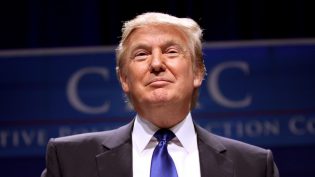
The people who listen to the public radio program Marketplace are largely the people you might expect to listen to a public radio show about business and the economy. They skew middle-aged — the median age is 52, though a third of audience members are between 25 and 34. Most are male. And the average listener’s income is $101,000.
 The Christian Science Monitor is betting big on constructive, non-depressing (but paid-for) newsCan Marketplace reach an audience beyond those who already care about explainer journalism?Ezra Klein hopes Vox can change the fact that “people who are more into the news read the news more”
The Christian Science Monitor is betting big on constructive, non-depressing (but paid-for) newsCan Marketplace reach an audience beyond those who already care about explainer journalism?Ezra Klein hopes Vox can change the fact that “people who are more into the news read the news more”One of the centerpieces is a new podcast, Make Me Smart, with hosts Kai Ryssdal and Molly Wood, which will launch next week on January 24. The podcast’s tagline is “Because none of us is as smart as all of us,” and it aims to approach explainer journalism in a slightly new way: through a group conversation.
Make Me Smart seems, at first glance, to fall into a category of popular podcasts that flatter the listener’s intelligence by chattily distilling dense, wonky topics. (See: Freakonomics, Invisibilia, Hidden Brain.) But the podcast aims to go beyond “didja know?” to both examine the way healthcare, work, wages, and cultural imports and exports are shifting under the Trump administration (which helps differentiate it from the popular NPR finance podcast Planet Money) and help listeners make sense of current events. One upcoming episode, for instance, will look at how the administration may conduct industrial policy via Twitter, and how American companies may have to monitor social media for events that are going to affect their bottom lines.
Explainer sites like Vox “do a great job,” Wood told me, noting that Make Me Smart will aim to provide a similar sort of context and analysis. But “a thing that we will do differently from Vox or a pure explainer site is that we will bring in these other voices. We’ll all achieve expertise in conversation, so that you don’t have to necessarily believe any one of us.”
She pointed out, “If I read a Vox explainer, I have to believe Ezra Klein or whoever wrote it. Our goal is to provide context, analysis, and point of view, and that point of view can come from the other people on the show — and even if you don’t believe me, you might believe the person we have on the show. Our attempt to get the answer is going to be transparent. We’re going to say: Hey, audience, can you help me with this? Our kind of information gathering will be clear and will involve our audience. That’s an interesting, and exciting, way to build this.” Listeners can submit questions on Make Me Smart’s website and Facebook page, and there will be weekly Facebook Live sessions.
Marketplace has already sought to diversify its audience through partnerships with other media properties. A Marketplace collaboration with Frontline and PBS NewsHour, “How the Deck is Stacked,” covers stagnant wages and long-term unemployment in America and will wrap up this month. While Frontline and News Hour’s core audiences aren’t particularly different from Marketplace’s, “they have a stronger social presence than we do,” said Deborah Clark, Marketplace’s SVP and general manager. This partnership was about tapping into that.The company also sees young business professionals who aren’t already public radio listeners as a natural audience for expansion. It’s teamed with Business Insider and Quartz on podcasts. It’s also distributing its podcasts through new channels. One episode from Marketplace’s series on welfare also ran as an episode of 99% Invisible, which brought it over a million additional downloads.
The largest challenge inside Marketplace right now, Clark said, “is taking inventory on how we work. We’re linking everything with: ‘Well, does it really raise the intelligence of the country, and how do we know that?'”
It is a big, complicated question. “The country” is a tricky concept following an election in which the candidate who received the most popular votes will not be president. Marketplace’s content might be reaching younger audiences through Quartz and 99% Invisible, but those groups still probably have more in common with the show’s core audience than the migrant laborers and families receiving welfare assistance who are covered in the show’s episodes.
It’s a mistake, said Ryssdal, to assume that all of Marketplace’s listeners are privileged: When he says that “people don’t understand why there’s the disconnect between the headline economy and how they’re feeling,” he includes “people who know us and listen to us and yet are still economically disaffected — this is again anecdotal, but it’s based on my travels to places like Rochester and Yakima, Washington, and El Paso.”
I asked Clark how, post-election, Marketplace plans to avoid falling into the trap of covering grievances of white Trump voters at the expense of people of color, who overwhelmingly voted for Clinton no matter their income bracket. “Our coverage has been strong, and we want to expand that,” she said. “That’s one of the central issues of our time. After the recession, the recovery rate of communities of color has been significantly different from white communities…in terms of reaching that audience, that’s a great question. I think that has to happen very intentionally, with projects that specifically have the goal to make people who don’t have access to or aren’t listening to public radio smarter about the economy.” This is an area where partnerships will be helpful, she said, but “we need to identify” those possible partners “and make a big investment in that.”
Part of the answer will be an analytics team that can gauge progress more quickly. “We don’t routinely step back, look at our content, and say, ‘Oh, that’s who this hit. That’s how many people were on the site because of this. That’s who then went to the radio shows and listened to this piece we promoted.’ We don’t have that working as a well-oiled machine,” she said. “We produce good content, we distribute it, and we move on.” This analytics team will help use a “more data-informed approach to content,” but it’s still down the road, and building it will follow the eventual hiring of the chief content officer.
“I know we’re on the right track,” Clark said. “It’s our job to do more of that storytelling, but also to think more about how we are telling the story outside the traditional audience of public radio. Growing a new audience has to be in partnership with entities that don’t look like us and don’t speak to the same group. That has to be the next stage for us: Both reflecting stories, and bringing back that information to people who don’t currently get any of that. I wish we were a year further along on executing this big strategic plan. I want to be bigger now. I want to be reaching more people now.”
Whether Marketplace can reach more people “in this new environment of politics is a really interesting challenge,” Ryssdal said. “It’s something that we’re thinking about every single day. It’s going to be the defining element of the next four years: How the economy translates into what happened in the election, and how this election translates into what’s going to happen to the economy. That’s the device that we have: Me and our reporters, getting out there and hearing everybody’s stories.”